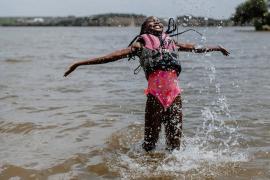Research has suggested there are numerous benefits to regular journaling. Studies have shown that journaling can help reduce anxiety and depression, while increasing gratitude and improving memory function (Tartakovsky, 2022; Baikie & Wilhelm, 2005; Sohal et al., 2022). Besides that, it can be a fun way to document your thoughts, write down favorite parts of your day, and stay organized as you look to the future. With so many benefits, you would think that everyone would keep a journal. However, as we get busy, journaling is often not set as a priority.
The idea for using journals at our camp actually originated as a tool for campers. In 2020, we weren’t able to offer regular camper sessions, but we still wanted to offer a resource to stay connected and mindful together as a Falling Creek community. We introduced a 10-week printable Camper Journal that was emailed out to camp families each Friday, and reflected on 10 different themes together. We followed along with the camper journal on our social media, and did weekly “Morning Watch” videos on Wednesdays that related to the week’s theme.
Happily, 2021 saw the return of regular camp, but the journals for campers had given us an idea. We decided to create custom printed counselor journals for our staff to emphasize how the personal development at camp doesn’t end after you’re a camper. Working as a counselor is another chance to grow, reflect, and continue building life skills, and the goal of the journal was to be a new resource for our staff to support their personal growth. For our summer staff, we wanted to make the habit of journaling as accessible and easy as possible. So, in 2021 we started to hand out custom staff journals during orientation week, which would guide counselors through daily questions and give them a place to put their thoughts each day during the summer.
The purpose of these counselor journals was three-fold — we wanted to equip our summer staff for success by:
- Emphasizing the importance of their own personal growth and health
- Enabling them to pay attention to campers’ personal growth and health
- Answering questions they may have about how camp functions in the summer
To guide staff in reflecting on their own personal growth, each day had its own page, along with a question for the day and space to write. Daily questions included things like, “What do you want the culture of your cabin to be?”, “What do you hope to achieve personally by the end of this summer?”, or “What's one thing you did today that you want to continue as a habit?” The daily question was intended to provoke thought and act as a starting point, so that the blank page wasn’t intimidating for staff who may not be used to journaling. However, these questions were only suggestions, and staff could use the space on each page in any way that worked best for them.
Each week the journals had a different theme, with inspirational quotes at the beginning of each week’s pages. Themes included values like hope, bravery, or humility. There was a weekly list of questions for staff to discuss with campers during "Evening Embers" time at the end of the day, and these often fit within that week’s theme. At the end of a week’s pages, there was also a weekly check-in page and a page to plan for the week ahead. This helped staff identify and track their personal and professional goals and consider intentions for the week ahead.
Additionally, each week had a Camper Notes section to check in with each camper on how they are doing, write any health notes, document growth opportunities, and ensure they are having fun and reaching goals. It had space to answer the questions, “What are you noticing about them this week?” and “How is their progress on their session goals?” for each camper. This would come in handy when writing weekly letters home to parents, or in having follow-up conversations with campers throughout the session.
Finally, each session had a calendar to help staff stay organized throughout the summer. This calendar had important dates, as well as any theme days or evening program events listed. This way we knew that regardless of whether a staff member used the journal daily, everyone at least had a resource with important dates and information listed. At the beginning of the journal, more resources were listed that were geared toward helping first-year staff feel more informed. This included a mini camp dictionary with some of our “lingo” explained in simple terms, maps of camp, a basic timeline of camp history, our FCC Code, session dates, and deadline reminders.
Based on feedback from staff after the first year of the journal, we made some slight changes for the most recent version. This included making the journal spiral-bound so that it was easier to lay flat when writing. We also simplified the daily questions, and made the "Evening Embers" questions a list of ones to choose from rather than specifying a certain topic for each day. For 2024, we plan to keep much of the outline the same, but will likely choose new weekly themes (and thus new daily questions and "Evening Embers" topics) to ensure it is fresh for returning staff. Though not every staff member chose to actually use the journal as a daily resource, the ones who did said that they enjoyed having it and that it improved their time at camp.
Our hope was that during the summer, the journal would help staff feel more organized, informed, and focused on goals. By the end of the summer, this would hopefully translate into a greater feeling of accomplishment. Staff who used the journal daily were able to leave camp with three months of collected thoughts, memories, ideas, goals, and progress tracked into their own journals, to be able to look back on for years to come.
References
Tartakovsky, M. (2022, February 22). 6 Journaling Benefits and How to Start Right Now. Healthline. healthline.com/health/benefits-of-journaling
Baikie, K., & Wilhelm, K. (2005). Emotional and physical health benefits of expressive writing. Advances in Psychiatric Treatment, 11(5), 338-346. doi:10.1192/apt.11.5.338
Sohal, M., Singh, P., Dhillon, B. S., & Gill, H. S. (2022). Efficacy of journaling in the management of mental illness: A systematic review and meta-analysis. Family Medicine and Community Health, 10(1).
This blog was written on behalf of Project Real Job, whose purpose is to support camps in their efforts to recruit, hire, and retain staff.
Annie Ramsbotham is the media manager for both traditional and social media at Falling Creek Camp. She is the editor for their annual Grow & Behold magazine publication, writes blogs, keeps the website current, and manages Falling Creek’s social media accounts. She is passionate about cycling, and started a mountain bike program at a nearby girls camp as well as founded Henderson County's youth NICA mountain bike team. Annie graduated from Appalachian State University in 2018, with two degrees in Recreation Management and Sociology, focusing her Honors thesis on the benefits of camp. Email: [email protected]
Matt Sloan is the chaplain as well as shoulder season director at Falling Creek Camp. He works toward developing a culture of intentional, genuine and personal relationships amongst the staff and the campers. He graduated from the University of South Carolina in 1999 with a Liberal Arts degree in Psychology, and has spent the past 21 years ministering to teenagers on the Young Life staff in Asheville, NC. The greatest parts of him are his wife Leslie and his children Asher and Lucy. Email: [email protected]
The views and opinions expressed by contributors are their own and do not necessarily reflect the views of the American Camp Association or ACA employees.




